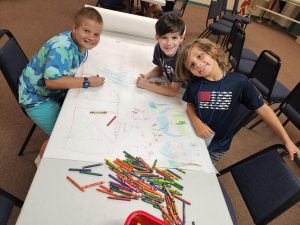Many 4-H clubs take a break during the summer months. Club leaders and youth may travel, have different summer schedules, or choose to participate in camps during the summer months. 4-H volunteers can help play a role in helping youth and families transition to summer activities. Furthermore, the transition from the club year to summer activities is an opportunity for volunteers to help lay a foundation for youth retention in the next 4-H year.
Research shows that summer activities can play an important role in youth development:
Out-of-school and summer programs can play a variety of important roles in supporting healthy development during childhood. First, out-of-school and summer programs provide a setting for children to experience supportive social relationships with both adults and peers, relationships that foster emotional, behavioral, and cognitive development. Second, such programs offer an opportunity for both structured and unstructured play, as well as a child’s choice in activities. This may be particularly important as schools increasingly focus on structured academic learning, even in the early grades (Bassok et al., 2016), and as other societal changes, such as increased parental employment and greater digital engagement decrease opportunities for unstructured play (Yogman et al., 2018).
(Hutton R. & Sepúlveda MJ, 2019)
Club Year Transitions
Club leaders may choose to close out the club year when the school year ends. This ending may involve a celebration, a recognition of achievement, or it may take the form of electronic communication with parents. It is important to close the club experience with an invitation for future 4-H engagement. This engagement may be day or residential camp, the next club year, a 4-H Open House event. Other club leaders may change the meeting schedule or offer different activities during the summer months. Youth may transition to an older age group with the new club year or may choose switch clubs as interests change. The summer months offer opportunities to help youth choose the next step in their 4-H experience. It is helpful to follow up with a club year recap email that includes summer resources and suggestions. Adding in the date of the fall 4-H Open House event and preview information about the next club year can help increase member retention from year to year.
Opportunities for Senior 4-H Youth
If your county offers summer day camps, your 4-H agent may be able to engage high school age senior 4-H youth as volunteers. The summer volunteer camp counselor experience can play an important role for rising ninth through twelfth graders who are looking to develop valuable workforce skills and experience. An added plus for youth is that 4-H volunteer hours can count toward fulfilling the Bright Futures service hours requirement.
4-H Summer Camps
Your local Extension office likely offers a variety of themed 4-H day camps that focus on life skills. The state 4-H program also offers residential camps. Senior 4-H youth can also attend overnight events such as 4-H Legislature, 4-H University, and 4-H Grilling Camp. Intermediate youth have the option of participating in the iLead weekend. The county 4-H agent can help volunteers become well-versed in the many summer options offered by 4-H that are available for youth locally and around the state.
For more information, contact your local Extension office and bookmark the state 4-H page.
Resources for Additional Reading
Ellison, S., & Harder, A. (2018). Factors Contributing to the Retention of Senior 4-H Members: From the Youth Perspective. Journal of Human Sciences and Extension, 6(3), 10. DOI: https://doi.org/10.54718/LCJZ7328
Hutton R. & Sepúlveda, MJ, editors. (2019). Shaping Summertime Experiences: Opportunities to Promote Healthy Development and Well-Being for Children and Youth. Washington (DC): National Academies Press (US); 2019 Sep 26. 3, The Effects of Summertime Experiences on Children’s Development. National Academies of Sciences, Engineering, and Medicine; Division of Behavioral and Social Sciences and Education; Board on Children, Youth, and Families; Committee on Summertime Experiences and Child and Adolescent Education, Health, and Safety. Available from: https://www.ncbi.nlm.nih.gov/books/NBK552668/
Lewis, K. M., Hensley, S., Bird, M., Rea-Keywood, J., Miller, J., Kok, C., & Shelstad, N. (2022). Why Youth Leave 4-H After the First Year: A Multistate Study. Journal of Human Sciences and Extension, 10(3), 5. DOI: https://doi.org/10.55533/2325-5226.1429
Newby, L. & Sallee, J. (2016). 4-H Membership Recruitment/Retention Problems: A Meta-Analysis of Possible Causes and Solutions. Journal of Youth Development. 6. 37-46. 10.5195/JYD.2011.163.
- All About Tabletop Exhibits for the North Florida Fair - September 10, 2024
- Beyond the Blue Ribbon: Make the Most of the 4-H Experience with Your Local Fair - July 5, 2024
- Tips to Help Youth and Families Handle Back-to-School Stress - July 28, 2023


